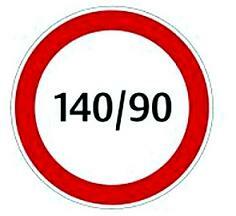 Pressure 140 to 90 in medical terminology is known as a state of borderline hypertension, since for some people this is normal, and for the majority - the first sign of the onset of the disease.
Pressure 140 to 90 in medical terminology is known as a state of borderline hypertension, since for some people this is normal, and for the majority - the first sign of the onset of the disease.
Age changes in the body lead, as a rule, to the further development of this state - a stable increase in pressure, and there is a risk of certain diseases of the cardiovascular system.
Causes of pressure 140 to 90
The pressure is 140 to 90 mm. gt; Art. - this is the minimum figure, which, in the second measurement, is already considered first-degree arterial hypertension or by another borderline hypertension.
Doctors identify the main causes that lead to the development of hypertension:
- Obesity. Each kilogram of excess weight increases the pressure by 1 mm Hg. That is, an extra 20 kg will lead to guaranteed hypertension.
- Improper diet, including eating a large amount of salt. Alcohol abuse.
- Heredity. If the next of kin (parents, siblings) suffered from hypertension.
- Eyest. The walls of the arteries lose elasticity over the years, the resistance of the blood vessels to the blood flow increases, the pressure increases.
- Arterial hypertension may be secondary, i.e., with kidney diseases, pathology of kidney vessels, endocrine diseases, coarctation of the aorta.
- Constant stress.
With a constant, if slight increase in pressure, not only arteries and blood vessels are damaged, but also the heart, the brain and even vision deteriorates. The most dangerous manifestation of hypertension is the hypertensive crisis, which develops from a sharp jump in pressure.
What is hypertension?
This is a steady increase in blood pressure from 140/90 mm Hg. Art. and higher. According to statistics, only 20-30% of patients with hypertension receive adequate therapy, and only 7% of men and 18% of women regularly monitor their blood pressure.
In the initial stages, arterial hypertension is asymptomatic or is detected accidentally during the screening or referral of patients to the doctor for the treatment of other diseases.
With prolonged high blood pressure, the walls of the vessels thicken and lose the ability to relax, this prevents normal blood supply and, as a result, the saturation of tissues and organs with oxygen and other nutrients, a decrease in their functional activity. Let's consider in more detail, than dangerous a hypertension:
- hypertensive crisis;
- myocardial infarction or stroke;
- angina pectoris;
- heart failure;
- cardiac ischemia;
- kidney failure;
- distortion of vision.
To avoid any complications, which are so dangerous hypertension, it is necessary to consult a doctor in a timely manner and make a survey that will help determine the stage of the disease and prescribe the required treatment.
Symptomatology
Moderately high blood pressure may often not manifest itself for a long time. A person can not feel it, do not pay attention to the almost imperceptible change in his state, considering its normal - not without reason for the pressure of the borderline type, the name of the silent killer was fixed.
Complaints at increased pressure:
- poor state of health and blurred consciousness;
- heaviness and pain in the head, heart pain;
- pulsation of the vessels of the head;
- feeling of "sand" in the eyes;
- nausea;
- fever and hyperemia in the face;
- stuffiness in the ears;
- slight confusion of consciousness.
Some people tolerate these figures well, and they do not complain about the deterioration of their well-being, while others tolerate them extremely painfully.
What to do at a pressure of 140 to 90
Medications at a pressure of 140 to 90 consist in the appointment of physicians of various groups of antihypertensive agents. Their action consists in deducing from an organism of an excessive liquid, expansion of vessels that promotes depression of pressure.
Drugs that help reduce blood pressure are divided into five groups.
- Diuretics(indapamide, furosemide). Treatment with them is carried out very carefully, since along with the liquid from the body is excreted potassium, which is very important for the heart.
- Calcium antagonists("Verapamil", "Nifedipine"). These drugs block the calcium channels, and do not allow the walls of the vessels to shrink. As a result, there is an increase in the lumen of blood vessels, the blood flow is restored and the pressure is normalized. The use of calcium antagonists is contraindicated in narrowing the aorta, heart failure, ventricular dysfunction, arrhythmia.
- Group of ACE inhibitors- drugs intended for long-term treatment of hypertension, including borderline hypertension (have contraindications - they can not be prescribed for renal failure, allergic reactions to drugs, pregnancy, and during feeding).
- Adrenoblockatores(antennaol, betaxolol). Prevent the effects on the vessels of adrenaline.
- Angiotensin antagonists("Cosaar", "Lozartan"). Have the same contraindications as ACE inhibitors.
As for folk remedies, the positive effect is given by the intake of tinctures and broths from adonis, yarrow and viburnum, Japanese sophora and plantain, mistletoe and peppermint, dried flower valerian and horse chestnut, calendula and hawthorn. They allow to lower the level of arterial pressure to acceptable values.

How to choose probiotics for the intestine: a list of drugs.

Effective and inexpensive cough syrups for children and adults.

Modern non-steroidal anti-inflammatory drugs.

Review of tablets from the increased pressure of the new generation.
 Antiviral drugs are inexpensive and effective.
Antiviral drugs are inexpensive and effective.



